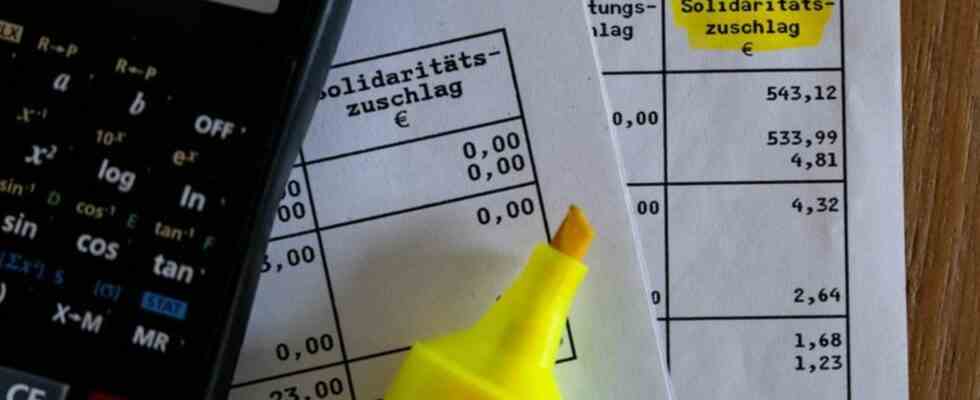Steer
The solos remain – the Federal Fiscal Court rejects the lawsuit
The Federal Fiscal Court dismissed a lawsuit against the solidarity surcharge. photo
© Sven Hoppe/dpa
The solidarity surcharge was never intended as a perpetual tax. But almost thirty years after its introduction, there is no end in sight to the levy. An attempt to overturn him in court has failed for the time being.
After a failed lawsuit against the solidarity surcharge, the federal government can continue to plan annual income in the tens of billions from the levy. The Federal Fiscal Court (BFH) in Munich dismissed a lawsuit against the solidarity surcharge on Monday.
This is not unconstitutional, decided the IX. Senate of the highest German finance court. The couple from Aschaffenburg had requested the submission to the Federal Constitutional Court, supported by the Taxpayers’ Association. The plaintiffs now have four weeks to lodge a possible constitutional complaint in Karlsruhe.
Reunification causes further financial needs
“In the present case, the court is not convinced that the solidarity surcharge for 2020 and 2021 is unconstitutional,” said BFH President Hans-Josef Thesling – the lawsuit was directed against the tax assessments for these two years. According to the judgement, the federal government has explained that the reunification will cause further increased financial requirements, even if the earlier solidarity pacts for financing the uniform burdens have expired.
The income from the solidarity surcharge is still high, mostly paid by companies and higher earners. “If we look at the years 2021/22/23, then we have 53 billion euros,” said Reiner Holznagel, President of the Taxpayers’ Association. “That’s a house number.”
Holznagel appealed to the federal government to abolish the solidarity surcharge because the levy, which has always been the subject of controversy, was only intended to be temporary when it was introduced in the 1990s. “After a generation – about 30 years – the solos should be gone, so to speak,” said Holznagel. “It would therefore be good if politicians were now planning to exit further.”
Is the Soli a “tax on the wealthy”?
In 2019, the former grand coalition decided in the “Act on the Reduction of the Solidarity Surcharge 1995” that ninety percent of income taxpayers should remain exempt, with the top ten percent having to pay the surcharge. In fact, the explanatory memorandum to the law also expressly mentions a “first step” and “subsequent complete dismantling”.
The lawsuit relied on the fact that the purpose of the soli had already ceased to exist: the levy was used to finance Solidarity Pact II, which expired at the end of 2019 and was intended to finance the development of infrastructure in eastern Germany.
The Federal Fiscal Court did not follow this: The federal government may therefore levy the solidarity surcharge due to increased financial requirements for the unit even without a solidarity pact. “An additional fee does not have to be limited from the outset or levied for a short period of time,” said BFH President Thesling.
In addition, the taxpayers’ association and the plaintiff accuse the federal government of violating the principle of equality in the Basic Law, because only a small minority of income taxpayers have to pay the levy, but not the vast majority.
Taxpayer President Holznagel and law professor Roman Seer therefore call the soli a “tax on the wealthy.” The head of the institute for tax law at the University of Bochum had represented the lawsuit before the BFH.
The dispute in court could continue
The Senate also rejected this argument. According to the judgement, the federal government can limit taxes that are geared to the “capacity of the taxpayer” to people with higher incomes from a social point of view.
Seer called the decision “disappointing”. “You are in God’s hands in court and on the high seas,” he quoted an old juridical adage after the verdict. According to him, it has not yet been discussed whether the plaintiff spouses want to file a constitutional complaint. Irrespective of this, FDP members of the Bundestag had already submitted a constitutional complaint in 2020.
The traffic light coalition is divided. The FDP supports the abolition of the soli, the Greens are against it. “It would have been absurd to relieve the richest 10 percent of the country when many people hardly know how to pay their bills at the end of the month,” commented the deputy leader of the Greens, Andreas Audretsch.
The Federal Ministry of Finance, headed by FDP leader Christian Lindner, is still counting on Karlsruhe after the verdict. “The federal government has an interest in a constitutional clarification,” it said in ministry circles.
In the opposition, the CDU and CSU assume that the soli should not become a perpetual tax. The constitutionality remains dependent on the federal government demonstrating special financial needs for the creation of the unit, said Union parliamentary group vice-president Mathias Middelberg. “In this respect, it is foreseeable that the authorization of the solo will expire.”

